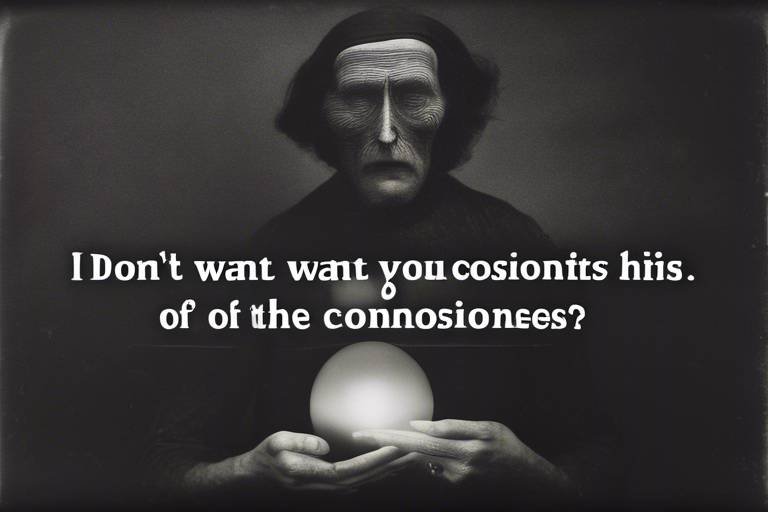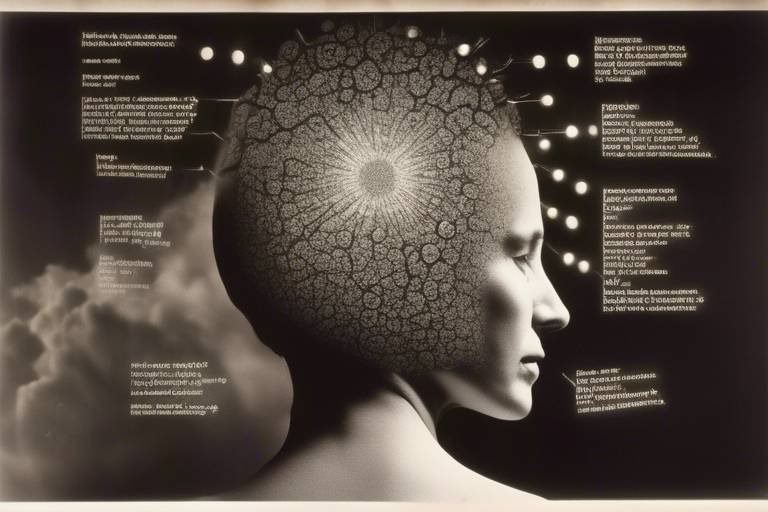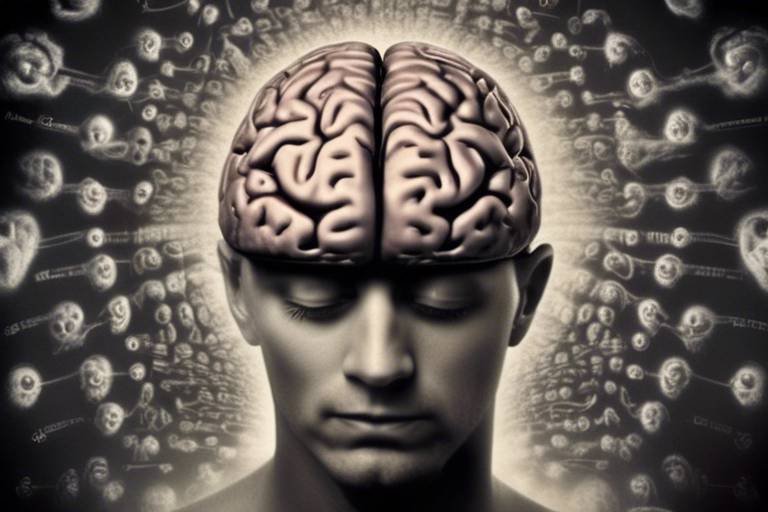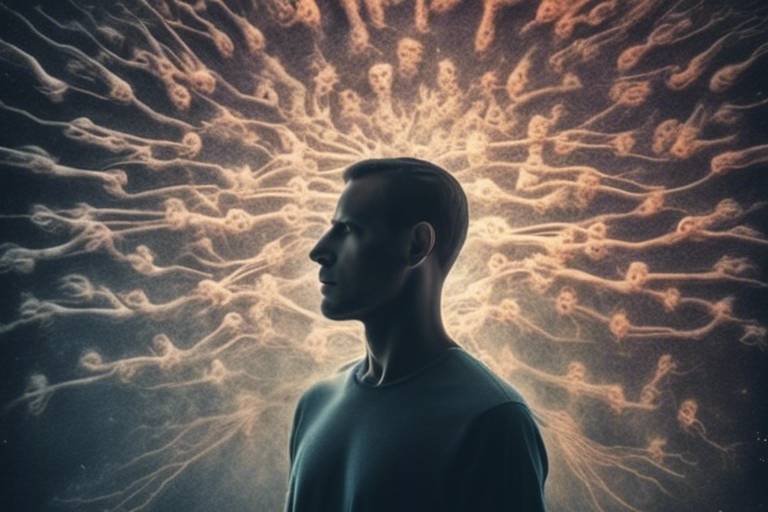Unraveling the Intricacies of Mind-Body Dualism
Have you ever pondered the relationship between your thoughts and your physical body? This age-old question has captivated philosophers, scientists, and curious minds alike. At its core, mind-body dualism is the philosophical concept that posits the mind and body as two distinct entities. This perspective raises profound questions about consciousness, identity, and the very nature of reality. As we delve into this intricate subject, we will explore its historical roots, key arguments, and the implications it holds for our understanding of what it means to be human.
To truly grasp the complexities of mind-body dualism, we must first journey back in time to its origins. The concept has deep roots in various philosophical traditions, dating back to ancient civilizations. For instance, the ancient Greeks, particularly Plato, suggested that the mind (or soul) existed independently of the body. Fast forward to the Enlightenment period, and we encounter René Descartes, a pivotal figure who famously declared, "Cogito, ergo sum" (I think, therefore I am). His assertions about the separation of mind and body laid the groundwork for modern dualistic thought.
Throughout history, thinkers have grappled with the implications of dualism. From Aristotle to contemporary philosophers, the discourse has evolved, shaping our understanding of consciousness and identity. The debates surrounding dualism have sparked a rich tapestry of philosophical inquiry, prompting questions that remain relevant today.
Among the myriad philosophers who have contributed to the discourse on mind-body dualism, Descartes stands out as a monumental figure. His profound insights into the relationship between the mind and body have influenced countless thinkers and continue to resonate in contemporary discussions. Descartes argued that the mind is a non-physical substance, fundamentally different from the physical body. This distinction has led to a plethora of interpretations and critiques, shaping the evolution of dualistic thought.
Descartes' influence on dualism cannot be overstated. His assertion that the mind is a distinct entity has sparked debates that echo through the ages. He posited that the mind, characterized by thought and consciousness, exists independently of the body, which is governed by physical laws. This radical idea opened the door for future philosophical inquiry, challenging scholars to consider the implications of such a separation.
Delving deeper into Descartes' philosophy, we find his assertion that the mind is a non-physical substance. This claim raises intriguing questions about the nature of consciousness. If the mind is separate from the body, what does that mean for our understanding of identity and self-awareness? Critics from materialist perspectives have challenged Descartes' view, arguing that consciousness arises from physical processes in the brain. This ongoing debate continues to fuel discussions in both philosophy and neuroscience.
Conversely, the body is viewed as a tangible, physical entity, bound by the laws of nature. This duality—where the mind is seen as non-physical and the body as physical—has led to various interpretations in philosophical contexts. How do these two seemingly disparate entities interact? This question lies at the heart of the mind-body dualism debate, prompting scholars to explore the intricate connections between our mental states and physical existence.
In the contemporary landscape, views on mind-body dualism have evolved significantly. With advancements in neuroscience and psychology, modern thinkers are re-evaluating the traditional dualistic framework. The integration of scientific insights into the discourse has led to a more nuanced understanding of consciousness, challenging the rigid boundaries once established by Descartes. As we navigate this complex terrain, we find ourselves at the intersection of philosophy and science, grappling with the implications of dualism in light of modern discoveries.
As with any philosophical perspective, mind-body dualism faces its share of critiques. Materialism and physicalism, which assert that everything can be explained through physical processes, pose significant challenges to dualistic theories. These critiques force us to confront the validity of dualism and its implications for our understanding of consciousness and identity.
Materialism fundamentally challenges the core tenets of dualism by positing that everything, including consciousness, is rooted in the physical realm. This perspective argues that mental states are simply byproducts of brain activity, undermining the notion of a separate, non-physical mind. As we explore these materialist critiques, we are compelled to reconsider our assumptions about the nature of consciousness and what it means to be human.
Beyond dualism, various philosophical frameworks offer alternative views on the mind-body relationship. Monism, for instance, posits that mind and body are not separate entities but rather different aspects of the same reality. Functionalism also presents a compelling alternative, suggesting that mental states are defined by their functional roles rather than their physical substrates. These perspectives contribute to the ongoing debate, enriching our understanding of consciousness and identity.
The mind-body dualism debate carries profound implications for our understanding of consciousness. Different interpretations of this relationship influence our views on self-awareness, identity, and the nature of subjective experience. As we navigate the complexities of dualism, we must grapple with the fundamental question: what does it mean to be conscious? This inquiry invites us to explore the depths of our own existence, challenging us to reflect on the intricate tapestry of mind and body.
- What is mind-body dualism? - Mind-body dualism is the philosophical concept that the mind and body are two distinct entities that interact with one another.
- Who are the key philosophers associated with dualism? - René Descartes is the most notable figure associated with dualism, but other philosophers like Plato and Aristotle have also contributed to the discourse.
- What are the main critiques of dualism? - Major critiques come from materialism and physicalism, which argue that everything, including consciousness, can be explained through physical processes.
- How does dualism relate to modern science? - Modern neuroscience and psychology challenge traditional dualistic views by providing insights into how mental states correlate with brain activity.
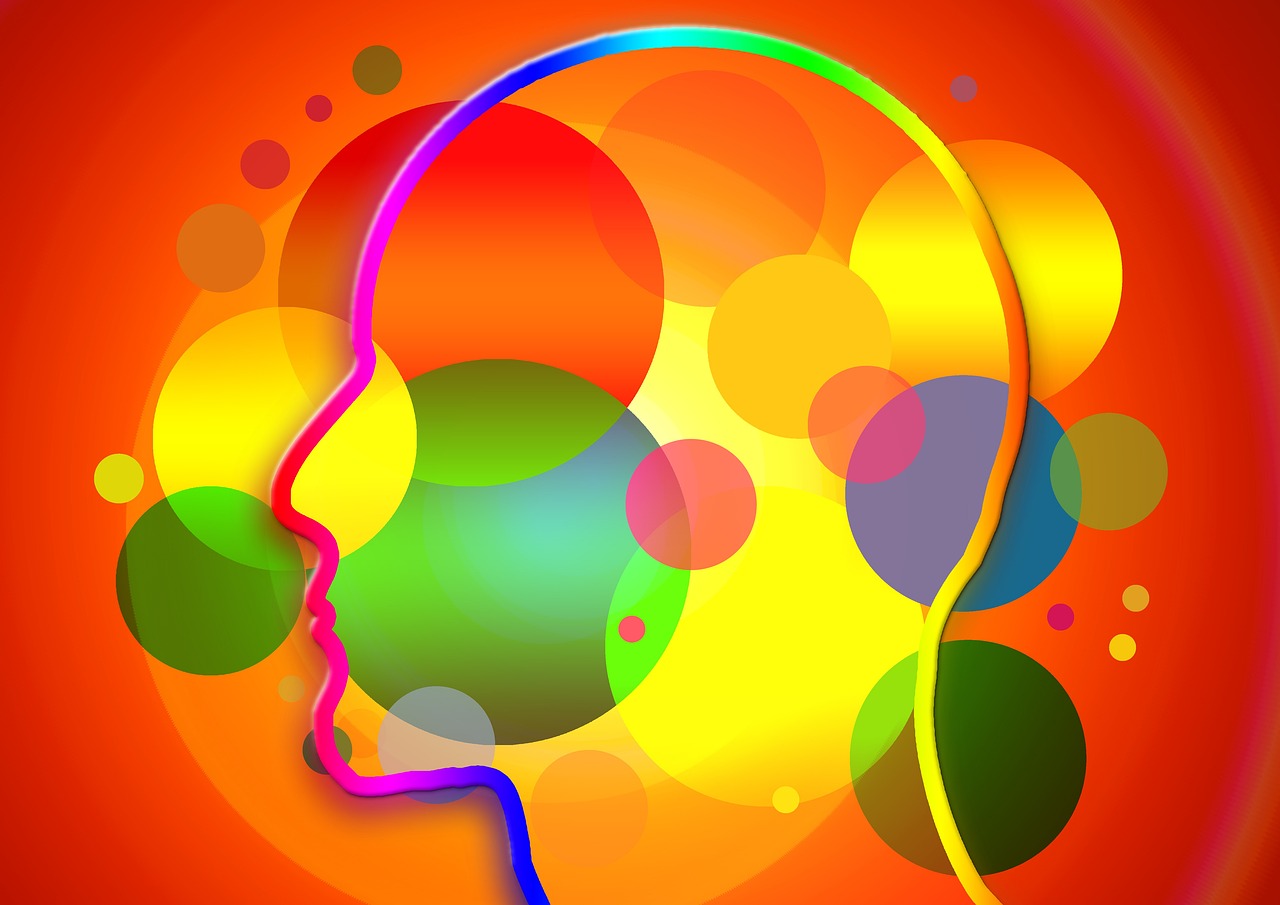
Historical Background
Understanding the origins of mind-body dualism is crucial for grasping its significance in philosophical discourse. This concept has roots that stretch back to ancient civilizations, where thinkers began to ponder the relationship between the mind and the body. In ancient Greece, philosophers like Plato proposed ideas that hinted at a distinction between the physical body and the non-physical realm of thoughts and ideas. Plato's theory of forms suggested that the material world is just a shadow of a higher reality, setting the stage for dualistic thought.
Fast forward to the 17th century, and we encounter the influential figure of René Descartes. Often dubbed the father of modern philosophy, Descartes famously articulated the dualistic view that the mind and body are fundamentally different substances. His famous dictum, "I think, therefore I am" encapsulates the idea that the act of thinking is proof of one's existence, independent of the physical body. This notion sparked a wave of discussions and debates that would ripple through the centuries.
Throughout the Enlightenment, the dialogue around dualism became more pronounced. Thinkers like John Locke and Gottfried Wilhelm Leibniz contributed to the discourse, each adding their unique perspectives. Locke's emphasis on experience and perception contrasted with Leibniz's concept of monads, which suggested that everything in the universe is made up of simple substances that interact in complex ways. These discussions laid the groundwork for later explorations into the nature of consciousness and identity.
In the 19th century, the rise of scientific inquiry began to challenge traditional dualistic views. The advent of psychology and neuroscience brought forth new questions about the mind's relationship with the brain. As scientists like Charles Darwin explored the biological basis of behavior, the idea that the mind could be understood solely through physical processes gained traction. This shift marked a critical moment in the evolution of dualism, as many began to question whether the mind could truly exist independently of the body.
Today, the historical journey of mind-body dualism reflects a rich tapestry of philosophical thought. From ancient Greece to modern neuroscience, the exploration of this duality continues to provoke questions about the essence of consciousness, identity, and reality itself. As we delve deeper into the implications of dualism, it becomes evident that understanding its historical context is essential for engaging with contemporary debates.
As we move forward, it's important to recognize that the discussions surrounding mind-body dualism are not just academic; they resonate with our everyday experiences. How often do we feel our emotions influencing our physical state or vice versa? This interplay is a testament to the complexity of the mind-body relationship, underscoring the relevance of dualism in our lives today. So, what does this mean for our understanding of ourselves and the world around us? The journey through the historical background of mind-body dualism invites us to ponder these profound questions.

Key Philosophers
The exploration of mind-body dualism is deeply intertwined with the thoughts of several key philosophers who have shaped the discourse surrounding this enigmatic relationship. Among these thinkers, René Descartes stands out as a pivotal figure. His assertion that the mind and body are fundamentally different substances has sparked debates that resonate through centuries of philosophical inquiry. Descartes famously declared, "Cogito, ergo sum" (I think, therefore I am), emphasizing the primacy of the mind in understanding existence. This declaration not only set the stage for dualistic thought but also raised profound questions about the nature of consciousness and reality.
Another notable philosopher, Plato, laid early groundwork for dualistic ideas with his theory of forms, suggesting that the physical world is merely a shadow of a higher, non-material reality. He believed that the soul, akin to the mind, is immortal and distinct from the body, which he viewed as a temporary vessel. Plato's influence is evident in the way later thinkers approached the mind-body relationship, often drawing a line between the tangible and the intangible.
In contrast, David Hume challenged the dualistic viewpoint by advocating for a more empirical approach. He argued that human understanding is rooted in sensory experiences, thus diminishing the significance of the mind as a separate entity. Hume's skepticism about the self and consciousness as distinct from the physical body invites us to reconsider the assumptions of dualism and question whether the mind can exist independently of the body.
Additionally, Immanuel Kant offered a unique perspective by proposing that while we can never fully know the "thing-in-itself" (the reality beyond our perceptions), our experiences are shaped by both the mind and the physical world. Kant's synthesis of rationalism and empiricism provides a bridge between dualistic and materialist perspectives, suggesting that our understanding of reality is a complex interplay between both realms.
To illustrate the evolution of thought regarding mind-body dualism, the table below summarizes the key contributions of these philosophers:
| Philosopher | Key Contribution |
|---|---|
| René Descartes | Established dualism; emphasized the mind's primacy. |
| Plato | Introduced the idea of the soul as distinct from the body. |
| David Hume | Challenged dualism; emphasized empirical understanding. |
| Immanuel Kant | Proposed a synthesis of mind and body experiences. |
As we navigate through the thoughts of these philosophers, it's clear that the dialogue surrounding mind-body dualism is rich and multifaceted. Each thinker brought their unique lens to the table, prompting us to question the very nature of our existence. The interplay of ideas from these key figures not only illustrates the complexity of the mind-body relationship but also encourages ongoing exploration into what it means to be conscious and alive. So, how do we reconcile these diverse perspectives in the context of modern philosophy? The answer may lie in our ability to adapt and integrate these age-old ideas with contemporary scientific understanding.

Descartes' Influence
René Descartes, often hailed as the father of modern philosophy, made a monumental impact on the discourse surrounding mind-body dualism. His assertion that the mind and body are fundamentally distinct entities has shaped philosophical inquiry for centuries. Imagine standing at a crossroads where two paths diverge: one leads to the tangible world of physical matter, while the other ascends to the ethereal realm of thoughts and consciousness. Descartes chose to explore both paths, and in doing so, he laid the groundwork for countless debates about the essence of human existence.
At the heart of Descartes' philosophy is his famous declaration, "Cogito, ergo sum" (I think, therefore I am). This statement encapsulates his belief that the act of thinking is proof of one's existence, underscoring the primacy of the mind over the body. For Descartes, the mind is a non-physical substance, a realm where thoughts, feelings, and consciousness reside. This idea not only set him apart from his contemporaries but also ignited a firestorm of discussion about what it means to be human. He argued that the mind is an immaterial entity, distinct from the physical body, which he viewed as a machine operating under the laws of physics. This dualistic framework has had profound implications, influencing not only philosophers but also scientists and theologians.
To further understand Descartes' influence, it's essential to consider the key components of his dualistic theory:
- Substance Dualism: Descartes posited that there are two types of substance: mental and physical. This separation implies that mental phenomena cannot be fully explained by physical processes.
- The Pineal Gland: Descartes believed that the pineal gland was the point of interaction between the mind and body, a curious notion that sparked further inquiry into the relationship between these two realms.
- Methodological Skepticism: His approach to doubt and questioning laid the foundation for modern scientific inquiry, encouraging a rigorous examination of beliefs about the mind and body.
Despite his groundbreaking contributions, Descartes' ideas were not without their critics. Philosophers like Spinoza and Leibniz challenged his views, arguing for a more integrated understanding of the mind and body. However, Descartes' influence persisted, shaping the course of Western philosophy and paving the way for future thinkers to engage with the complexities of consciousness and identity.
In today's context, Descartes' dualism invites us to question the very nature of reality. Are we merely biological machines, or is there something more profound at play? His work encourages us to explore the depths of our own consciousness, prompting inquiries that resonate even in contemporary discussions about artificial intelligence, neuroscience, and the essence of self-awareness.
As we delve deeper into the implications of Descartes' philosophy, it becomes clear that his influence is not confined to the pages of history. It continues to challenge us to reconcile the tangible and intangible aspects of our existence, making his contributions to the mind-body dualism debate as relevant today as they were in the 17th century.
- What is mind-body dualism?
Mind-body dualism is the philosophical concept that the mind and body are distinct and separate entities, each with its own properties and characteristics. - Who is René Descartes?
René Descartes was a 17th-century French philosopher known for his contributions to modern philosophy, particularly his ideas on dualism. - What are the main criticisms of dualism?
Critics argue that dualism fails to account for the physical basis of mental processes and that it creates unnecessary complications in understanding consciousness. - How does dualism relate to modern science?
While dualism presents challenges to scientific perspectives, contemporary discussions often seek to reconcile dualistic views with findings from neuroscience and psychology.

Mind as Non-Physical
The concept of the mind as a non-physical substance is one of the cornerstones of dualistic philosophy, particularly as articulated by René Descartes. Descartes famously proposed that the mind, or the soul, is distinct from the body and operates independently of physical processes. This notion raises fascinating questions about the nature of consciousness and identity. If the mind is non-physical, how does it interact with the physical body? This interaction is often referred to as the "mind-body problem," a term that encapsulates the complexities of understanding how two seemingly disparate substances can influence one another.
To grasp Descartes' assertion, it’s crucial to consider the implications of a non-physical mind. For instance, if thoughts, emotions, and consciousness exist independently of the brain, what does that mean for our understanding of mental health, cognitive function, and personal identity? Are we merely biological machines, or is there something more profound that defines our existence? These questions challenge us to rethink our understanding of reality. The mind, as a non-physical entity, suggests that our thoughts and experiences are not confined to the biological workings of the brain, but rather exist in a realm that transcends physicality.
Critics of dualism, particularly from materialist perspectives, argue that this separation leads to more questions than answers. They contend that if the mind is non-physical, it becomes difficult to explain how it can affect physical actions—like moving a finger or speaking a word. This critique brings us to the idea of interactionism, a viewpoint that suggests the mind can influence the body and vice versa. However, the mechanisms of this interaction remain elusive and have sparked extensive philosophical and scientific inquiry.
Moreover, the non-physical aspect of the mind opens the door to discussions about the nature of consciousness itself. Is consciousness an emergent property of complex physical systems, or does it exist as a separate entity? This dichotomy leads to a variety of philosophical perspectives, including:
- Substance Dualism: The belief that the mind and body are fundamentally different substances.
- Property Dualism: The idea that while the mind and body are not separate, the mind possesses properties that cannot be reduced to physical explanations.
- Epiphenomenalism: The view that physical processes can influence the mind, but the mind cannot influence the body.
Each of these perspectives attempts to address the challenges posed by the concept of a non-physical mind. As we delve deeper into the implications of dualism, we find ourselves at a crossroads of philosophy, science, and spirituality, each offering unique insights into the nature of our existence.
- What is mind-body dualism? Mind-body dualism is a philosophical concept that posits the existence of two distinct substances: the mind (non-physical) and the body (physical).
- Who is the main proponent of mind-body dualism? René Descartes is the most notable philosopher associated with mind-body dualism, famously declaring "I think, therefore I am."
- What are some criticisms of mind-body dualism? Critics argue that dualism creates more questions than it answers, particularly regarding the interaction between the mind and body.
- Are there alternatives to dualism? Yes, alternatives such as materialism, monism, and functionalism offer different perspectives on the relationship between mind and body.

Body as Physical
The concept of the body as a physical entity is foundational to understanding the mind-body dualism debate. At its core, this idea posits that our bodies are tangible, material substances that can be observed, measured, and studied scientifically. Think about it: when you stub your toe, you feel pain, and that pain is a direct response to a physical injury. This physicality is what distinguishes the body from the mind, which is often viewed as abstract and elusive. The relationship between the mind and body has been a topic of fascination and inquiry for centuries, leading to various interpretations and theories.
In the realm of philosophy, the body is often seen as a vessel for the mind, a physical structure that houses our consciousness and enables our interactions with the world. This perspective can be likened to a car that transports a driver; the body is the vehicle, while the mind is the driver navigating through life. This analogy underscores the importance of the body in facilitating our experiences and shaping our identities. Yet, it also raises questions about how these two entities interact. If the mind is non-physical, how does it influence the physical body? And conversely, how does the physical state of the body impact the mind?
Throughout history, various philosophical traditions have grappled with these questions. For instance, Aristotle viewed the body and soul as intertwined, suggesting that the soul (or mind) cannot exist without the body. This holistic approach contrasts sharply with Descartes' dualism, where he emphasized a stark separation between the two. In modern discussions, the body is often examined through the lens of neuroscience, which investigates how brain activity correlates with physical sensations and emotional states. This scientific perspective offers a compelling argument for the body’s primacy in understanding consciousness and identity.
Moreover, the body’s physicality has implications for how we perceive health and well-being. In a world increasingly focused on mental health, it's crucial to recognize that our physical state can significantly influence our mental well-being. Consider the following points:
- Physical exercise has been shown to enhance mood and reduce anxiety.
- Nutrition plays a vital role in cognitive function and emotional stability.
- Sleep, a physical necessity, is crucial for mental clarity and overall health.
These examples illustrate that the body is not merely a shell for the mind; it is an integral component of our overall experience. The interplay between the mind and body highlights the complexity of human existence, prompting us to consider how we can achieve balance between the two. As we continue to explore this duality, it becomes increasingly clear that understanding the body as a physical entity is essential for unraveling the mysteries of consciousness and identity.
- What is mind-body dualism? Mind-body dualism is a philosophical concept that posits the existence of two distinct entities: the mind (non-physical) and the body (physical).
- Who is the main proponent of mind-body dualism? René Descartes is often credited with formulating the dualistic perspective, famously stating, "I think, therefore I am."
- How does the body influence the mind? The body can impact mental states through physical health, exercise, nutrition, and sleep, all of which contribute to our overall well-being.
- Are there alternatives to dualism? Yes, alternatives include materialism, which posits that everything is physical, and monism, which suggests that mind and body are aspects of a single substance.

Modern Perspectives
As we leap into the 21st century, the discourse surrounding mind-body dualism has undergone a transformative shift, largely influenced by advancements in neuroscience and psychology. Gone are the days when philosophers solely debated the metaphysical aspects of the mind and body; today, the conversation is enriched by empirical evidence and scientific inquiry. This modern perspective invites us to reconsider the age-old questions of consciousness, identity, and the essence of being.
One of the most fascinating developments in this field is the integration of neuroscience into the dialogue on dualism. Researchers have made significant strides in understanding how brain activity correlates with mental states. For instance, neuroimaging techniques, such as fMRI and PET scans, allow scientists to observe the brain in action, unveiling the intricate connections between neural processes and conscious experience. This has led to a growing skepticism about the traditional dualistic view that separates the mind from the body. Can we truly claim that the mind exists independently of the physical brain when we can see the brain's activity corresponding to thoughts and emotions?
Moreover, contemporary philosophers are not merely dismissing dualism; instead, they are engaging in a dialogue that attempts to reconcile dualistic notions with scientific findings. Some propose a property dualism perspective, suggesting that while the mind and body are interconnected, they possess distinct properties. This view allows for a nuanced understanding of mental phenomena without completely abandoning the dualistic framework. It raises intriguing questions: Are our thoughts merely byproducts of brain activity, or do they hold a unique essence that transcends physicality?
Another modern perspective gaining traction is the functionalism approach. Functionalists argue that mental states are defined by their functional roles rather than their composition. This means that consciousness and mental experiences can be understood in terms of their causal relationships and interactions with the environment, rather than being tied to a specific physical substrate. This perspective aligns with the scientific understanding of consciousness, suggesting that even if the mind and body are distinct, they work in harmony to create our subjective experiences.
In addition to these philosophical advancements, the rise of artificial intelligence (AI) and cognitive science has sparked new debates about the nature of consciousness. If machines can simulate human-like responses and behaviors, what does that imply about the mind-body relationship? Are we on the brink of redefining what it means to be conscious? These questions challenge the traditional boundaries of dualism and invite us to explore the implications of consciousness beyond biological confines.
In summary, the modern perspectives on mind-body dualism are not just about affirming or rejecting the dualistic framework; they are about engaging in a rich, multifaceted dialogue that incorporates scientific insights, philosophical inquiries, and technological advancements. As we continue to explore the depths of consciousness and identity, it becomes increasingly clear that understanding the mind-body relationship requires a collaborative approach that transcends disciplinary boundaries.
- What is mind-body dualism? Mind-body dualism is the philosophical concept that the mind and body are distinct entities that interact with each other.
- Who are the key philosophers associated with dualism? René Descartes is one of the most notable philosophers associated with dualism, but others like Plato and Kant have also contributed to the discourse.
- How has modern science influenced the debate on dualism? Advances in neuroscience and psychology have provided empirical evidence that challenges traditional dualistic views, leading to new interpretations and frameworks.
- What are some alternatives to dualism? Alternatives include materialism, monism, and functionalism, which offer different perspectives on the mind-body relationship.
- Can machines be conscious? This is a debated topic; while AI can mimic human behavior, whether it possesses consciousness is still a matter of philosophical inquiry.

Critiques of Dualism
The concept of mind-body dualism has faced significant scrutiny over the years, particularly from proponents of materialism and physicalism. These critiques question the validity of dualism's fundamental assertions, arguing that the separation of mind and body is not only problematic but also outdated in the context of modern science. One of the most prevalent challenges to dualism is the materialist perspective, which posits that everything that exists is fundamentally physical. This stance raises a critical question: if everything is physical, how can we account for the subjective experiences that we associate with the mind?
Materialists argue that consciousness, thoughts, and emotions can be fully explained through physical processes in the brain. They suggest that mental states are directly correlated with brain states, and therefore, any attempt to separate the two is misguided. For instance, when someone experiences joy, it can be traced back to specific neural activities and chemical reactions occurring in the brain. This leads us to ponder whether the mind is merely a byproduct of physical processes, rather than an independent entity. The implications of this argument are profound, as it challenges the very essence of what we consider to be the 'self.'
Moreover, dualism faces criticism for its inability to explain the interaction between the mind and the body. How can a non-physical mind influence a physical body? This question has puzzled philosophers and scientists alike. Dualists often resort to vague explanations or appeal to metaphysical concepts, which can seem unsatisfying to those seeking a more empirical understanding. In contrast, materialist theories provide a more cohesive framework, wherein mental phenomena are directly linked to physical states, allowing for a clearer understanding of human behavior and cognition.
In addition to materialist critiques, there are several philosophical alternatives that offer different perspectives on the mind-body relationship. For example, monism posits that there is only one substance, whether it be physical or mental, and that the apparent duality is an illusion. Functionalism, on the other hand, suggests that mental states are defined by their functional roles rather than their physical makeup. This perspective allows for a more flexible understanding of consciousness that aligns with contemporary findings in neuroscience.
To summarize, the critiques of dualism are multifaceted and deeply rooted in both philosophical and scientific discourse. The materialist argument presents a formidable challenge to the dualist framework, emphasizing the need for a more integrated understanding of consciousness. As we continue to explore the complexities of the mind-body relationship, it becomes increasingly clear that dualism may not hold the answers we seek. Instead, we may need to embrace a more nuanced approach that recognizes the interplay between the physical and the mental, ultimately enriching our understanding of what it means to be human.
- What is mind-body dualism? Mind-body dualism is a philosophical concept that posits the existence of two distinct substances: the mind (non-physical) and the body (physical).
- Who are the key philosophers associated with dualism? René Descartes is one of the most prominent figures associated with dualism, known for his famous assertion, "I think, therefore I am."
- What are the main critiques of dualism? The main critiques include materialist arguments that assert everything is physical, challenges regarding the interaction between mind and body, and the existence of alternative philosophical frameworks like monism and functionalism.
- How does dualism relate to modern science? Modern neuroscience and psychology often challenge dualistic views by linking mental states to physical processes in the brain, suggesting a more integrated understanding of consciousness.

Materialist Arguments
When diving into the realm of mind-body dualism, one cannot overlook the compelling arguments posed by materialism. At its core, materialism asserts that everything, including our thoughts, feelings, and consciousness, is fundamentally rooted in the physical world. This perspective challenges the very foundation of dualism, which posits a distinct separation between the mind and body. So, what does this mean for our understanding of consciousness and identity?
Materialists argue that all mental states correspond to physical states in the brain. For instance, when you feel happiness, there are specific neural pathways and chemical reactions occurring in your brain. This leads to the idea that mental phenomena can be explained entirely through physical processes. In essence, if we can map out the brain's activity, we could potentially understand and replicate every thought and emotion. This notion raises a fascinating question: if everything about our consciousness is tied to our physical state, can we truly claim that the mind exists independently of the body?
To further illustrate this point, consider the following examples that materialists often cite:
- Neuroscience Evidence: Advances in neuroscience have shown that changes in brain chemistry can lead to alterations in mood and behavior. For example, the introduction of serotonin can alleviate depression, suggesting that mental states are deeply intertwined with physical states.
- Brain Damage Studies: Cases of individuals with specific brain injuries often result in the loss of certain cognitive functions or personality traits. This indicates that our sense of self and consciousness is closely linked to the physical integrity of the brain.
- Artificial Intelligence: The development of AI and machine learning challenges the notion of a non-physical mind. If machines can replicate human-like responses and behaviors, what does this say about the uniqueness of human consciousness?
These arguments lead to a compelling critique of dualism. Materialists argue that dualism fails to provide a satisfactory explanation of how two distinct substances—the mind and body—interact. If the mind is non-physical, how does it influence physical actions? This question remains one of the most significant challenges to dualistic theories. Moreover, materialism posits that consciousness is not a separate entity but rather an emergent property of complex physical systems, which can potentially be studied and understood through scientific inquiry.
In summary, while mind-body dualism presents a fascinating perspective on the relationship between consciousness and the physical body, materialist arguments provide a robust counterpoint. They challenge us to consider the implications of a purely physical understanding of our thoughts and emotions. As we continue to explore these philosophical waters, it becomes increasingly clear that the debate is far from settled. The intersection of philosophy, neuroscience, and psychology invites us to rethink old assumptions and embrace new ideas about what it means to be conscious.
Q1: What is mind-body dualism?
A1: Mind-body dualism is the philosophical concept that the mind and body are distinct and separate entities. This theory suggests that the mind exists independently of the physical body.
Q2: How does materialism challenge dualism?
A2: Materialism argues that everything, including consciousness and mental states, is rooted in physical processes. This perspective challenges dualism by asserting that there is no need for a separate non-physical mind, as all mental phenomena can be explained through brain activity.
Q3: Can consciousness be fully explained by neuroscience?
A3: While neuroscience provides significant insights into the workings of the brain and its relation to consciousness, the complete understanding of subjective experiences and consciousness remains a complex and ongoing area of research.

Philosophical Alternatives
As we dive deeper into the debate surrounding mind-body dualism, it’s essential to explore the philosophical alternatives that challenge and enrich our understanding of the mind-body relationship. While dualism posits a clear division between the mental and the physical, other frameworks offer a more integrated perspective. These alternatives not only question the binary nature of dualism but also provide compelling insights into the complexities of consciousness and existence.
One prominent alternative is monism, which argues that everything is fundamentally one substance. Monists believe that both the mind and body are manifestations of a single underlying reality. This perspective can be further divided into two main categories: materialistic monism, which asserts that everything is physical, and idealistic monism, which suggests that everything is mental. For instance, materialistic monism aligns with scientific views, proposing that mental states are entirely reducible to physical brain states. This challenges the dualistic notion of a separate, non-physical mind.
Another significant alternative is functionalism, a theory that focuses on the roles or functions of mental states rather than their intrinsic nature. Functionalists argue that mental states can be understood in terms of their causal relationships—how they interact with sensory inputs and behavioral outputs. This approach allows for a more flexible understanding of consciousness, suggesting that mental processes can exist in various forms, not limited to human brains. Functionalism opens the door to the possibility of artificial intelligence possessing mental states, which raises fascinating questions about identity and consciousness.
Furthermore, panpsychism offers a radical perspective by suggesting that consciousness is a fundamental feature of all matter. According to this view, everything, from rocks to humans, possesses some degree of consciousness. While this idea may sound strange, it challenges the dualistic separation by proposing that consciousness is not exclusive to complex organisms. This perspective invites us to reconsider our relationship with the universe and the nature of consciousness itself.
It's also worth mentioning the embodied cognition theory, which posits that our cognitive processes are deeply rooted in our physical interactions with the world. This theory emphasizes that the mind cannot be fully understood without considering the body’s experiences and actions. It suggests a more integrated approach, where the mind and body are interdependent rather than distinct entities. This perspective aligns with contemporary neuroscience, which increasingly recognizes the importance of bodily experiences in shaping our thoughts and feelings.
In summary, while mind-body dualism presents a compelling framework for understanding consciousness, it is essential to consider these philosophical alternatives. Each offers unique insights and challenges the traditional dichotomy of mind and body. By engaging with these perspectives, we can enrich our understanding of consciousness, identity, and the nature of reality itself.
- What is mind-body dualism? Mind-body dualism is the philosophical concept that the mind and body are distinct entities, each with its own nature and properties.
- Who are some key philosophers associated with dualism? René Descartes is one of the most notable philosophers associated with dualism, famously articulating the distinction between the mind and body.
- What are the main critiques of dualism? Critics argue against dualism by proposing materialism, which states that everything is physical, and functionalism, which emphasizes the roles of mental states rather than their nature.
- What is monism? Monism is the philosophical view that everything is fundamentally one substance, rejecting the dualistic separation of mind and body.
- How does functionalism differ from dualism? Functionalism focuses on the functions and roles of mental states rather than viewing them as separate from physical processes.

Implications for Consciousness
The debate surrounding mind-body dualism has profound implications for our understanding of consciousness. At its core, this philosophical inquiry raises essential questions about what it means to be conscious and how our sense of self is constructed. When we think about consciousness, we often find ourselves grappling with the nature of our thoughts, feelings, and experiences. Are these elements merely products of our physical brain, or do they stem from a non-physical mind? This question isn't just academic; it touches on our very identity and how we perceive reality.
One significant implication of dualism is the notion of self-awareness. If we accept that the mind exists independently of the body, we might conclude that our conscious experiences are not entirely dependent on our physical state. This leads to intriguing considerations about the afterlife, the continuity of identity beyond physical existence, and the nature of personal experiences. Imagine, for instance, a scenario where a person's body is incapacitated, yet their mind remains fully aware. This raises the question: is there a distinction between being alive and being conscious?
Moreover, the implications of dualism extend into the realms of psychology and neuroscience. For instance, if consciousness is a separate entity, how do we account for the findings in neuroscience that link brain activity to mental states? This paradox invites a deeper exploration into the relationship between mental phenomena and brain processes. The following table summarizes some key implications of dualism for our understanding of consciousness:
| Implication | Description |
|---|---|
| Self-Awareness | Explores the distinction between consciousness and physical existence. |
| Identity Continuity | Questions the nature of personal identity beyond physical death. |
| Neuroscience Challenges | Examines the relationship between brain activity and mental states. |
Furthermore, the implications of dualism challenge our understanding of subjective experience. If we consider consciousness as a non-physical phenomenon, it invites us to reflect on how we experience emotions, thoughts, and sensations. For example, the feeling of joy or the pang of sadness—are these merely chemical reactions in the brain, or do they signify something deeper? This line of inquiry can lead to a richer understanding of human experience and the complexity of our emotional lives.
In light of these considerations, it's essential to recognize that the mind-body dualism debate is not just a theoretical exercise; it has real-world implications for how we understand ourselves and our interactions with the world. It influences fields such as psychology, philosophy, and even artificial intelligence, as we ponder whether machines could ever achieve a form of consciousness similar to ours. As we continue to unravel these intricacies, we are reminded that the essence of consciousness remains one of the most profound mysteries of our existence.
- What is mind-body dualism? Mind-body dualism is a philosophical concept that posits the mind and body as two distinct entities that interact with each other.
- Who is the most notable proponent of dualism? René Descartes is often credited as the most significant proponent of mind-body dualism.
- What are the implications of dualism for consciousness? Dualism suggests that consciousness may exist independently of the physical body, leading to questions about self-awareness, identity, and subjective experience.
- How does dualism relate to modern neuroscience? Dualism raises questions about how mental states correlate with brain activity, challenging our understanding of consciousness in light of scientific discoveries.
Frequently Asked Questions
- What is mind-body dualism?
Mind-body dualism is a philosophical concept that posits the existence of two distinct substances: the mind, which is non-physical, and the body, which is physical. This idea suggests that mental phenomena are, in some respects, non-physical and cannot be fully explained by physical processes.
- Who is the main philosopher associated with mind-body dualism?
René Descartes is often credited as the main philosopher associated with mind-body dualism. His famous declaration, "Cogito, ergo sum" (I think, therefore I am), emphasizes the separation of the mind and body, arguing that the mind is a non-physical substance that interacts with the physical body.
- How does mind-body dualism relate to consciousness?
The debate around mind-body dualism significantly impacts our understanding of consciousness. It raises questions about the nature of self-awareness and identity, suggesting that consciousness might exist independently of the physical body, which challenges materialist perspectives that view consciousness as a byproduct of physical processes.
- What are some critiques of mind-body dualism?
Critiques of mind-body dualism often come from materialist and physicalist viewpoints, which argue that everything, including consciousness, can be explained through physical processes. Critics question how a non-physical mind can interact with a physical body and point out the lack of empirical evidence supporting dualism.
- Are there alternative philosophical perspectives to dualism?
Yes, there are several alternative philosophical perspectives to dualism, such as monism, which posits that only one substance exists (either physical or mental), and functionalism, which focuses on mental states as functions rather than substances. These alternatives offer different frameworks for understanding the mind-body relationship.
- What implications does dualism have for identity?
Mind-body dualism has profound implications for our understanding of identity. It suggests that our mental experiences, thoughts, and consciousness could exist independently of our physical bodies, leading to discussions about what constitutes the self and how identity persists over time, even if the body changes.



